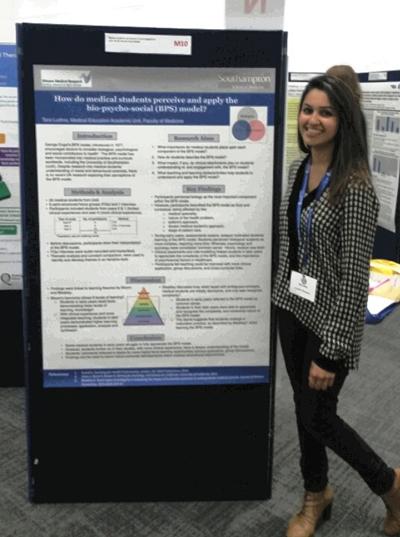
My project advice:
My project was based within the Medical Education department, and was a qualitative research project. Many aspects of the research were new to me: ethics approval, writing a literature review, understanding qualitative analysis techniques etc. However, good organisation and supportive supervisors allowed me to both enjoy the research process, and contribute to medical education.
1. Meet potential supervisors
When choosing your field and project, I would thoroughly recommend meeting with the supervisors within fields, or for specific projects that interest you. Some departments offer meetings whereby supervisors and students can attend. I was able to hear about each project, meet potential supervisors and organise meetings to further discuss projects that took my interest. A large part of the project relies on communication between yourself and your supervisor(s). Meeting with them allowed me to understand:
• how easy they were to contact,
• how involved they could be,
• what they hoped the project would achieve,
• my responsibilities, and discuss my ideas
2. Keep organised, and set deadlines
There are several deadlines for the project. One of the first things I did was to map out all of these onto a single page (which sat at the front of my allocated folder), and put these dates into my diary. Some documents need submitting via e-assignments and knowing my deadlines meant that I aimed to complete and upload my work a few days before (should the website have any technical difficulties- every student's nightmare)
With many of the tasks, your supervisors are able to read either the full document, or up to 3 pages. I found it helpful to regularly meet my supervisors and plan in deadlines for when I would email my work, and when they would provide feedback. This meant that they were able to read and provide feedback at times that they had fewer commitments. I did not have to feel too guilty about adding to their workload, or sending over documents unexpectedly. It also meant I had plenty of time to make any changes before submitting work.
3. Practise presenting. Take all opportunities
Presenting your research concisely but so that it is still understandable, and within a time limit takes practise. Medical education provided us with opportunities to present our research to students and supervisors within the team. Initially, I thought this would be extra work and potentially embarrassing. During my first mock, I ran out of time and couldn't present the main part of my project, the findings. In preparing for the second mock, I struggled to decide which components were important and should feature. You get the picture. The mocks helped me to understand the types of questions I could be asked, become confident presenting my work, and stick to time. When it came to my final presentation, I was so grateful for the mocks, as presenting was less intimidating.
4. Take pride in your research
My research explored medical students perceive and apply the bio-psycho-social model. I initially worried that people would think this boring or irrelevant. However, this was soon forgotten. I took great pride when, at mock presentations, staff within the medical education department would praise my project and tell me they were excited to hear the findings. When offered the chance to submit my work to a conference, I doubted the significance of my research. However, my supervisors assured me that I had nothing to lose, and that the experience would be great. I was pleasantly surprised and so happy when my work was accepted as a poster presentation. My proudest moment was winning the Jan Schmedlin prize for projects within the medical education department. My efforts and passion had helped me to create a project I was proud of, and that I wanted to share with others.
Enjoy and take pride in your project, and take opportunities to share it.